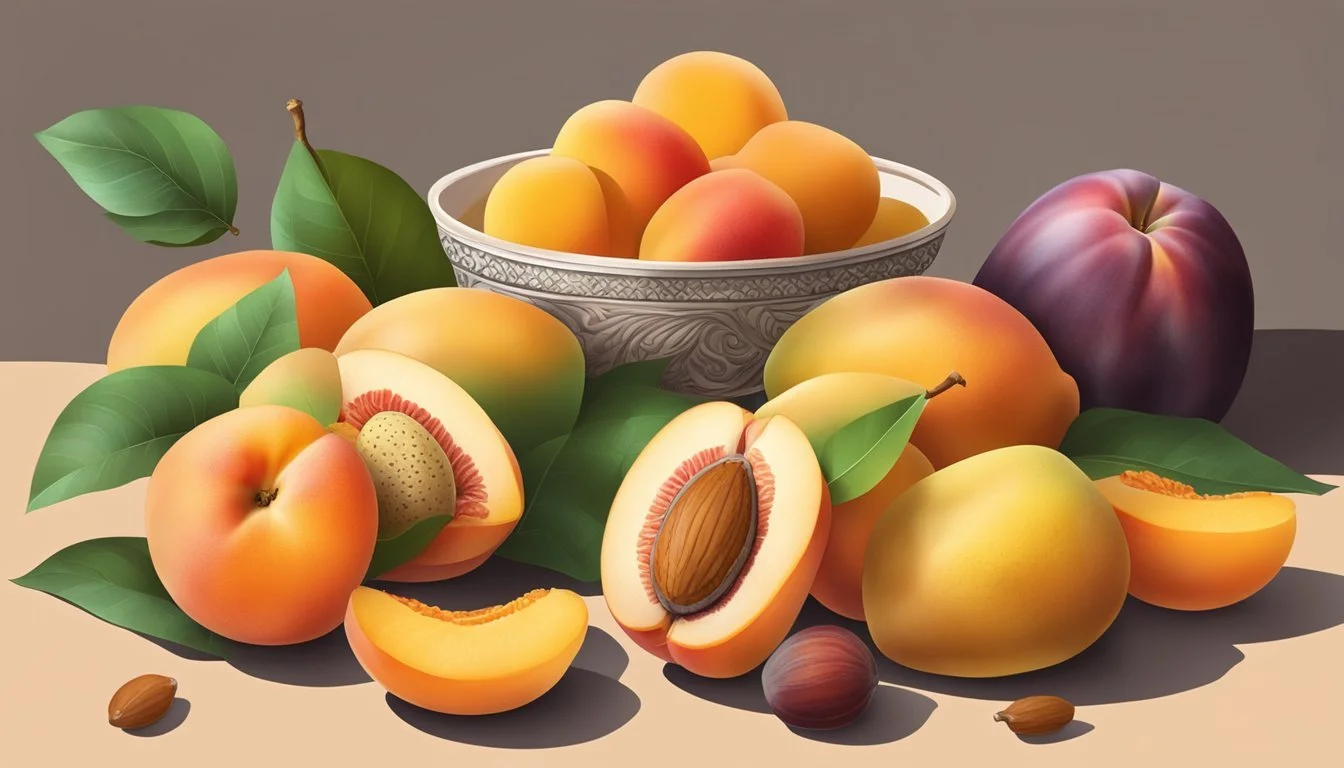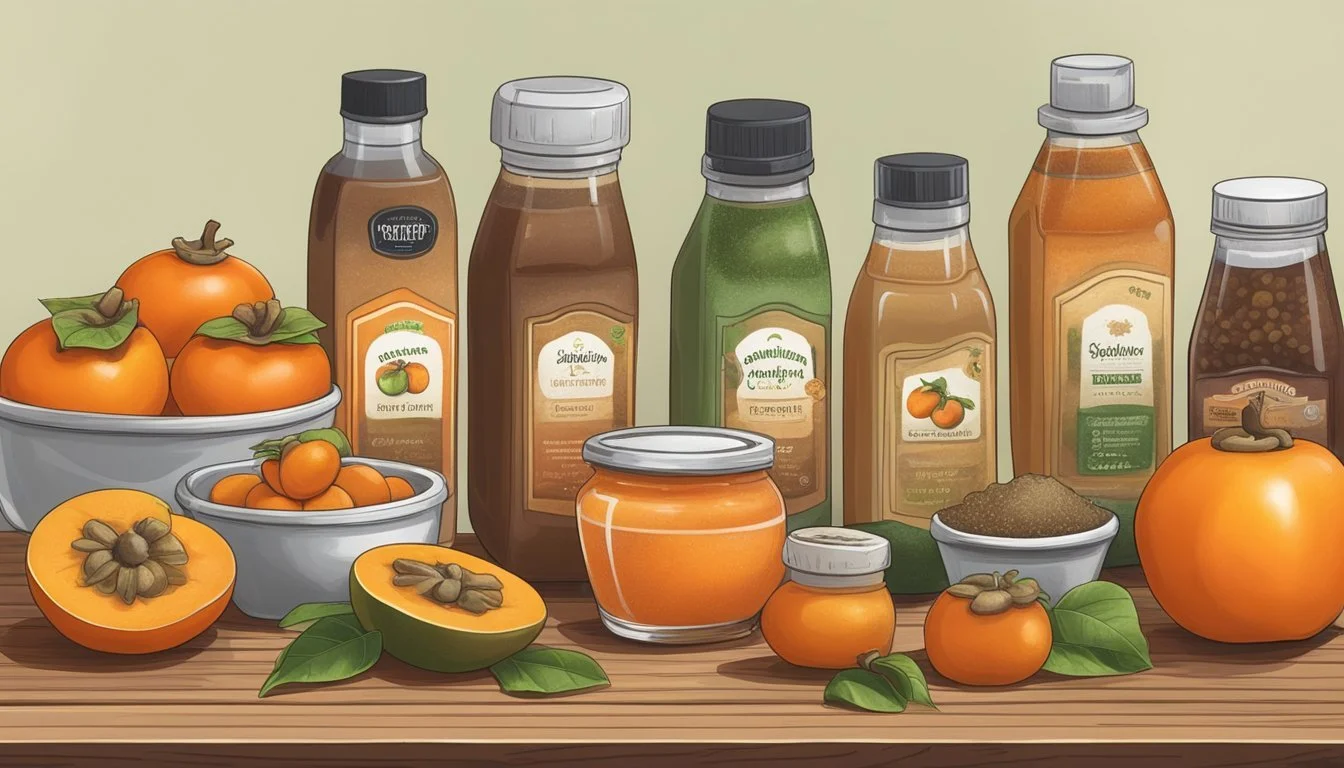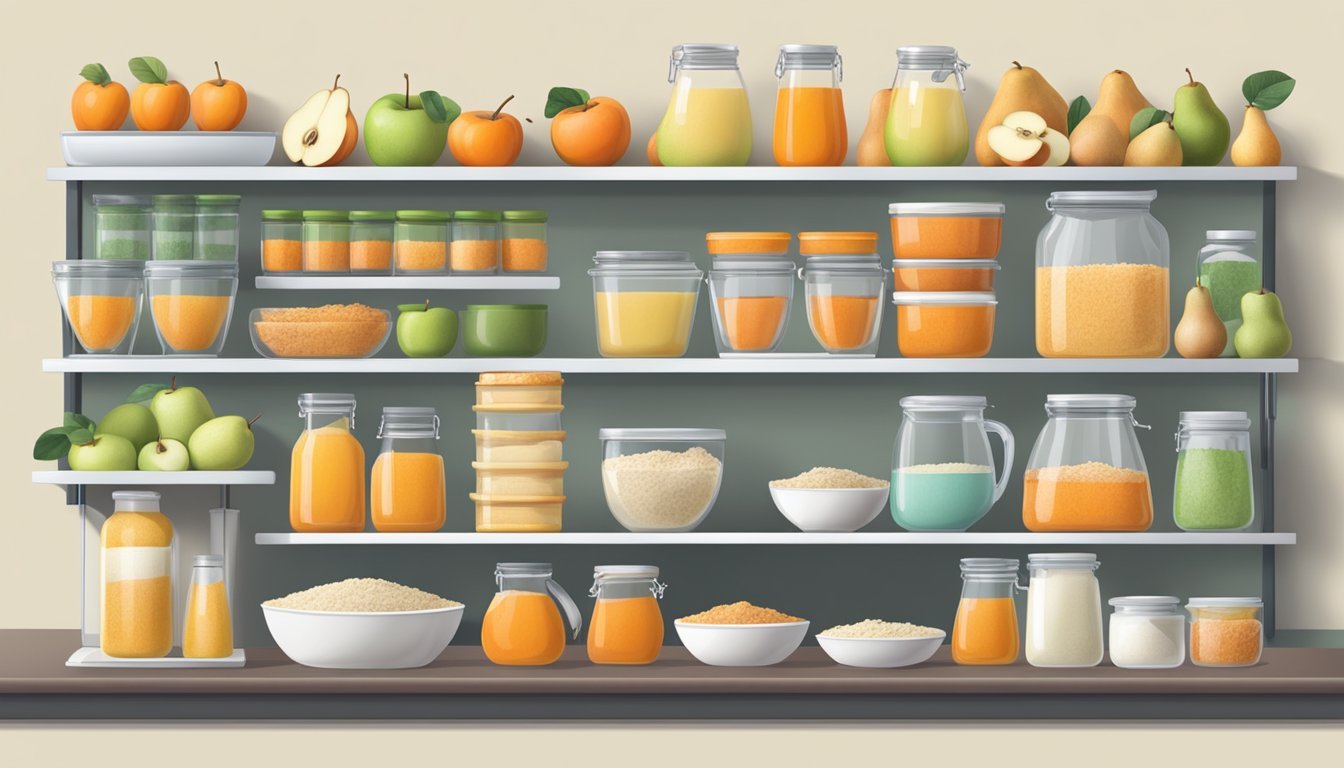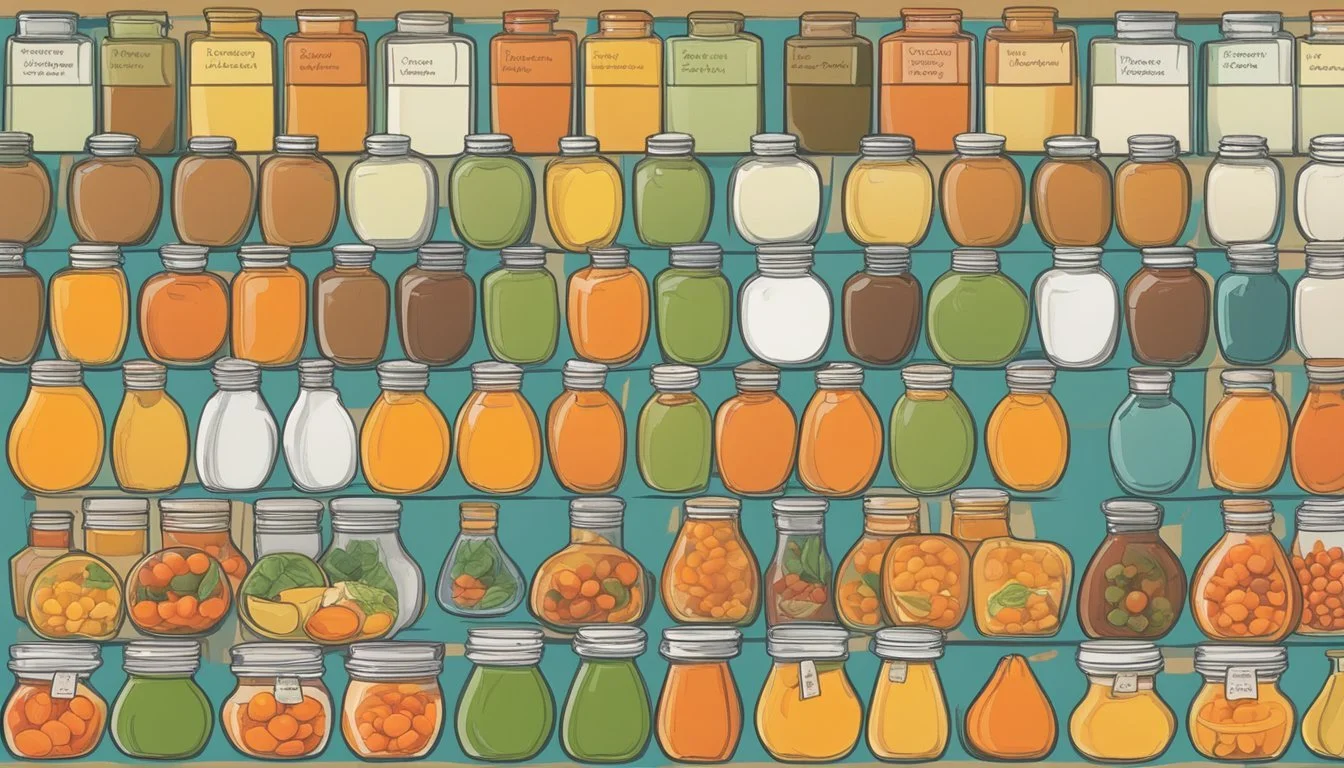Persimmon Substitutes
Top Alternatives for Baking and Cooking
Persimmons are a unique and flavorful fruit that are enjoyed for their sweet taste and nutritional value, particularly when they are ripe. There are two main types of persimmons: astringent and non-astringent. The astringent variety, which includes the Hachiya, is high in tannins and can be unpleasantly tart if eaten before it has fully ripened. Non-astringent persimmons, such as the Fuyu, can be enjoyed even when firm, offering a milder sweetness and a crunchy texture. Rich in vitamin C, fiber, and antioxidants, persimmons are not only a healthy choice but also contribute complex flavors to both sweet and savory dishes.
However, despite their growing popularity, persimmons may not always be readily available in markets, or people may have dietary restrictions or personal preferences that prompt the search for an alternative. Substitutes for persimmons should ideally mimic their sweet flavor profile while providing similar textural properties. Fruits like mangoes, with their juicy and fibrous flesh, can replicate the mouthfeel and sweetness of non-astringent persimmons. In comparison, apricots and peaches, which are also sweet and offer a slight tanginess, can serve as suitable replacements for imparting a similar taste in recipes.
Understanding Persimmons
Persimmons are a valuable fruit known for their unique flavor and nutritional properties. This section will explore the characteristics of persimmons, their nutritional benefits, and the popular varieties that are widely consumed.
Characteristics of Persimmons
Persimmons, belonging to the genus Diospyros, are typically sweet when ripe, with a smooth, honey-like flavor. They are categorized based on their astringency: astringent persimmons contain high levels of tannins and must be soft before they are palatable, while non-astringent varieties are sweet and firm even when just ripe and can be eaten like an apple. The skin of the fruit is thin and varies from light to dark orange.
Texture: Astringent persimmons such as Hachiya are soft and jelly-like when fully ripe, non-astringent types like Fuyu and Sharon fruit remain firm.
Astringency: Caused by tannins, diminishes as the fruit ripens, especially in Hachiya.
Flavor: Ranges from sweet to a balance of sweet and tart, often compared to honey and apricots.
Nutritional Benefits
Persimmons are a rich source of vitamins and antioxidants, offering various health benefits. They are particularly high in vitamins A and C, which are essential for the immune system, and contain a good amount of dietary fiber that is beneficial for weight management and diabetes control.
Nutrient Benefit Vitamin A Supports vision and immune system Vitamin C Important for skin health and immunity Fiber Aids in digestion and may help with weight loss Antioxidants Help protect cells from oxidative damage
Popular Varieties
The two most common types of persimmons are the Hachiya and the Fuyu. The Hachiya persimmon is heart-shaped and is best eaten when very soft due to its astringent nature when unripe. In contrast, the Fuyu variety is squat and can be consumed while still hard.
Hachiya: Large, acorn-shaped, very astringent before fully ripe.
Fuyu: Smaller, tomato-like shape, non-astringent, can be eaten like an apple.
Sharon Fruit: A type of non-astringent persimmon originally from Israel, similar to Fuyu in taste and texture.
Persimmons are predominantly grown in Asia, with China and Japan being major producers. They are enjoyed in various culinary applications, from being eaten fresh to incorporated into desserts and traditional dishes.
Persimmon Substitutes in Cooking and Baking
When cooking or baking with persimmons, various fruits can act as suitable substitutes, each bringing their distinct flavor and texture to the recipes. It's important for one to select the right substitute to achieve a satisfying outcome in dishes such as bread, desserts, salads, or sauces.
Fruits as Substitutes
Several fruits can replicate the sweet and sometimes spiced taste of persimmons in recipes. The texture they offer, whether in raw or cooked form, is also a crucial consideration for their use as alternatives. Among the fruits suggested:
Applesauce: An alternative for persimmons in baking due to its similar texture and sweetness.
Apricots: They can mimic the taste of persimmons and are beneficial in baking as they hold their shape well.
Bananas: Offer a creamy texture and natural sweetness in desserts and smoothies.
Mango, Peach, and Nectarines: These fruits can deliver a tropical flavor and juiciness similar to ripe persimmons.
Papaya and Pineapple: Both can be pureed and used in jams and smoothies.
Pears and Plums: Ideal for cooking and can be substituted in recipes where firm persimmons are required.
Black Sapote: Known for its chocolate pudding-like texture, works well in desserts.
These substitutes can often be used in equal amounts to persimmons but may require adjustments based on the individual sweetness and moisture content.
Using Substitutes in Recipes
When utilizing these substitutes, cooks should consider how the switch will affect the outcome of their dish. For instance:
Baking: To maintain moisture in baked goods like bread and pies, pureed fruits such as applesauce or banana work best.
Cooked Dishes: Firm fruits like pears and apricots are excellent when the recipes require cooking, as they retain structure.
Jams and Sauces: Fruits with high pectin content such as apples and plums can create the desired thickness.
Salads and Desserts: Fresh mango, peach, or nectarines add a juicy and firm texture to these dishes.
Smoothies: Banana or papaya can thicken smoothies while adding sweetness.
Cooking or baking with these fruit substitutes requires attention to ripeness, sweetness, and moisture levels to achieve the best results in flavor and consistency.
Flavor and Texture Profiles
Choosing the right substitute for persimmons in recipes hinges on understanding the unique flavor and texture profile of the fruit. Persimmons are known for their sweet and sometimes tangy taste, paired with a soft, creamy texture when ripe. Substitutes should ideally mimic these characteristics to maintain the integrity of the dish.
Comparing Taste and Texture
Flavor: Persimmons possess a distinctive sweet-taste. When ripe, they can exhibit hints of honey and cinnamon, complemented by a subtle tangy note. The fruit's flavor is versatile, suitable for both raw and cooked dishes, from salads to baked goods.
Texture: The texture of a ripe persimmon is soft and creamy, somewhat akin to a ripe peach. Ripe Fuyu persimmons can be firm with a crisp bite, similar to an apple.
When substituting for persimmons:
Dried apricots can mimic the sweet-taste of persimmons, albeit with a denser texture.
Bananas provide a creamy texture and a natural sweetness that complements desserts and smoothies.
Apples and applesauce offer a similar mouthfeel, especially useful for pureed applications.
Pumpkin and sweet potatoes, while not fruits, can mimic the soft texture and sweetness in baked dishes.
Impact of Substitutes on Dishes
Substitutes can significantly alter the flavor, texture, and appearance of dishes that originally call for persimmons. One should consider how the sweetness and texture of the substitute align with the desired outcome of the recipe.
In salads, where persimmons' raw texture and bright taste shine, crisp substitutes like apples may be appropriate.
For cooked dishes or jellies, where persimmons' soft texture is paramount, mashed bananas or pumpkin puree could be effective.
In terms of spices, substitutes that pair well with cinnamon and similar warm spices can often seamlessly integrate into recipes meant for persimmons.
By thoughtfully selecting substitutes, one can create a harmonious balance of flavors and textures that closely approximate the role of persimmons in any given dish.
Substitute Application by Recipe Type
When replacing persimmons in recipes, it's important to consider the substitute's texture and flavor profile to ensure it complements the dish's intended taste and consistency.
Substitutes in Sweet Dishes
In sweet dishes, such as desserts or baked goods, alternatives to persimmons should offer a similar sweetness and moisture content. For ripe persimmons often used in:
Baking: Ripe Fuyu persimmons can be substituted with Sharon fruit or apricots. Measure for measure, these fruits maintain the desired sweetness and moist texture.
Persimmon Replacement Amount Sharon Fruit 1 cup for 1 cup Apricots 1 cup for 1 cup
Desserts and Pies: Substitute with peaches when the persimmon provides succulence in pies. Select peaches that mirror the moisture level of the original recipe's persimmons.
Dessert Type Substitute Guidance Persimmon Pie Peaches Fresh, canned, or frozen to match consistency
Jams and Smoothies: Bananas offer a creamy texture with natural sweetness which is perfect for jams and smoothies. A higher quantity of banana is required to achieve the same level of sweetness and body that persimmons provide.
Persimmon Replacement Amount Banana 1 cup for every 2 cups
Substitutes in Savory Dishes
In savory dishes, the substitute should harmonize with the other ingredients while providing a balance of flavor without overpowering the dish.
Cooking and Salads: Tomatoes can be an effective stand-in for persimmons in some savory recipes, bearing in mind the acidity difference.
Persimmon Replacement Cooking Suggestion Tomatoes Use in sauces, poach lightly for salads
Sauces and Brown Sugar Caramel: For a deeper, sweeter taste in sauces or caramel, ripe apples and pears work well as replacements, especially when combined with brown sugar, offering a tartness paired with a subtle sweetness.
Persimmon Replacement Preparation Apple/Pear Can be cooked down into sauces or caramelized
It's important to note that while these substitutes can mimic the role of persimmons to a certain extent, each has its unique qualities that will impart a different character to the final dish. Cooks should adjust spice levels and cooking times accordingly.
Special Considerations for Substitutes
When selecting a persimmon substitute, it's essential to consider health benefits and availability. Each alternative brings its unique nutritional profile and seasonal constraints, which may impact your choice.
Health Considerations
Persimmons are known for their high content of vitamin A, vitamin C, and antioxidants, which support the immune system and may aid in weight loss and diabetes management. Substitutes should ideally offer similar benefits. For instance, apples and pears, which can replace persimmons in recipes, are also rich in fiber and may help prevent constipation. To compare:
Apples: High in fiber and vitamin C.
Pears: Contain fiber, less vitamin C than apples but are gentle on the stomach.
Apricots: Offer vitamin A and vitamin C; dried versions possess a concentrated nutrient profile.
Fuyu persimmons, which are non-astringent and can be consumed while still firm, are often recommended as a direct replacement due to their similarity in texture and sweetness, as well as nutritional properties.
Seasonal and Regional Availability
Persimmons are typically in season during the fall, particularly in regions such as Asia, the US, Japan, and China. Substitutes should be considered based on their own growth seasons and regional availability. For example:
Apples: Widely available year-round in many countries.
Pears: Have a season that overlaps with persimmons, providing a fall alternative in many of the same regions.
Quince: More region-specific and available in the fall, similar to persimmons.
It's noteworthy that a substitute's ripeness is crucial; astringent varieties like the Hachiya persimmon need to be fully ripe before consumption, so their replacements should match the desired sweetness and texture.
Conclusion
In the search for suitable persimmon substitutes, one must consider both flavor and texture to find the best alternatives for use in various recipes. Ripe persimmons have a unique sweet taste and soft, sometimes jelly-like texture, which can be essential in certain dishes.
Common substitutes for persimmon and their ratios include:
Bananas: Use a ratio of 2 cups mashed banana to 1 cup persimmon for a creamy texture and natural sweetness.
Apples & Pears: Offer a similar fibrous texture; utilize in equal amounts as persimmons.
Stone Fruits: Plums, apricots, and nectarines can be used in equal measure for their comparable sweetness and juiciness.
When cooking with these substitutes, it's important to note that each has its distinct taste and texture profile that will impart subtle differences to the final dish. While none can completely replicate the experience of persimmons, they can offer delightful variations.
In savory applications, Fuyu persimmons serve as an excellent stand-in for the astringent Hachiya variety, with less bitterness and a more tropical flavor profile. Determining the appropriate persimmon substitute ensures that the integrity of sweet and savory recipes is maintained when the original fruit is not available.








